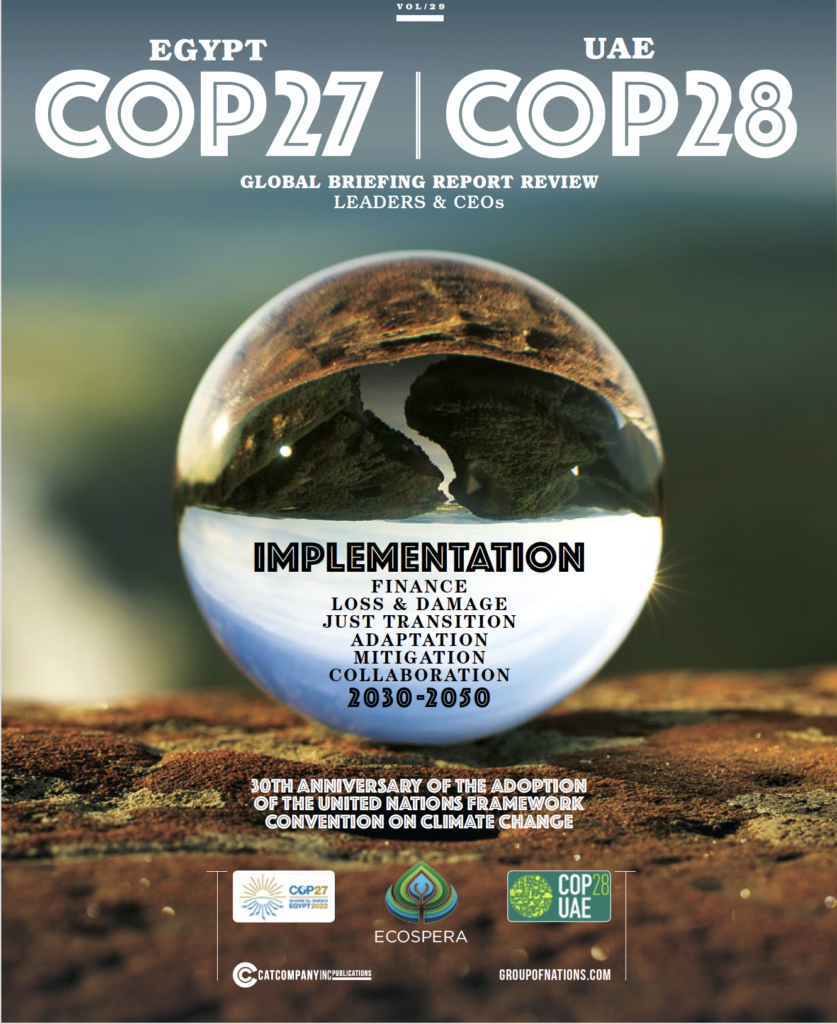ClimateEnvironmentG7 SummitNEWS
October 6, 2022
CPA Canada: Transition to net zero: Is it a government or business responsibility?,
6 October 2022

Transition to net zero: Is it a government or business responsibility?
By Gigi Dawe LL.M and Marc-André Paquette CPA, CA,
Introduction
There is deepening consensus amongst governments, businesses and societies that climate
change is global, the consequences are intensifying, and anthropogenic (human caused) factors
are the driving force. As spelled out by the United Nations Intergovernmental Panel on Climate
Change 1 , climate change (and the actions required to address it) will have consequential impacts
on economies, financial systems and the companies that operate within them.
Chartered Professional Accountants of Canada (CPA Canada) held consultations with business
leaders, investors, and policy developers to assess responsibility for climate action and whether
a national strategy is required to achieve success in the transition to net-zero. Differing opinions
emerged regarding responsibilities. There was consistency amongst those engaged, that all
sectors and participants, including policy makers, NGO’s, academia, investors, industries, their
supply chains and all levels of governments must play a role to achieve a desired outcome, and
that collaboration amongst those groups is central to success. However, thoughts about the
degree of involvement varied considerably. Agreement was unequivocal on the need to get past
talk, policy papers and plans to move to taking action. One participant noted that “we need to
stop talking and start acting.”
This article will focus on the role of a few key groups.
Context
An increased focus on climate issues is prompting new regulations and challenging historic
political reticence to carbon emissions regulations. Public interest is also driving investment
decisions by retail investors and beneficiaries of managed investments. Regulators, investors,
customers and employees are driving initiatives that stipulate useful, transparent, consistent
and comparable climate-related information. This is achieved through enhanced reporting of
climate change-related risks, mitigation strategies and opportunities but also through good
planning and good governance.
Perhaps one of the most notable outcomes of this shift in public interest, is the formation by the
International Financial Reporting Standards (IFRS) Foundation of an International Sustainability
Standards Board (ISSB). This initiative is driving the establishment of a global reporting
framework concerning climate-related disclosures, with a goal of comparable information. The
ISSB is also tasked to develop a comprehensive global baseline of high-quality sustainability
disclosure standards to meet investors’ information needs. It is anticipated that this may be the
catalyst that pushes global companies to take climate action.
1 IPCC Reports on Climate Change (conservation.org)
Central banks, investors, lenders and insurance have all stepped forward to acknowledge the
global scientific consensus on the risks and severity of climate change. But their role in
mitigating climate change, as well as the role of governments, the private sector, and
professional groups must be unambiguously clear. Who will absorb costs? How will changes in
government impact commitments? Does politics have a place in climate mitigation or
adaptation? How will action ensure transition to net-zero is not unduly punitive to those who
are acting? These are key questions that must be considered as governments and businesses
transition to net zero.
Role of government / regulators
There are currently 193 parties committed to the Paris Agreement 2 . What is not clear however,
is how many of those have an unambiguous plan and pathway to achieve their directives within
the timeframe they’ve committed to. Government policy must be clear and unequivocal about
how innovation will be funded, who is going to play, to pay, who does what, and when.
Many of those CPA Canada consulted, propose that government can play a significant role in
tackling climate change and getting to net-zero by providing a national strategy, policy direction,
and incentive through investing in innovation and funding transition efforts. Others, however,
suggest government can assess the merits of solutions only if companies, who have been
incentivized, are able to bring those solutions forward. And others say we could not expect
government to possess the level of expertise necessary to create policy and must count on
industry sectors, who have experience and expertise, to lead.
Many called-upon the government to act by offering a clear strategy that guides businesses,
municipalities, and citizens toward action. They proposed public/private partnerships as an ideal
approach to finance and build innovative solutions that properly align capabilities with needs. To
see benefits in the end game of solutions to the economy and themselves, companies and
citizens need a credible, transparent risk-return strategic plan.
Others suggest that the diversity amongst industries, provinces or states, and citizens would
render a single government proposed strategy impractical and impossible to execute. They say
each sector needs a roadmap and that collaboration across supply chains is the answer. Some
go further to suggest waiting for direction from government is an excuse for entities to delay
their own response.
Globally, governments are creating advisory committees or action councils to develop plans to
finance or take climate actions. As well, regulatory bodies are developing policy and
enforcement actions to govern compliance. It is pertinent, though, that those groups
understand industry and sector issues, and that the plans are realizable by the private sector.
Carbon taxes, cap-and-trade programs, restrictive legislation and even lawsuits to protect
communities may make it difficult for companies to carry on with “business as usual” 3 but the
alternatives must be doable and just.
2 The Paris Agreement | United Nations
3 Climate risk: Is it on your radar? (cpacanada.ca)
For example, as scope 3 emissions get more attention from regulators, disclosure may be
required. Industry members at all levels (those executing, executives and boards) must
understand what scope 3 emissions include and why disclosure is pertinent. Education will be
required as well as guidance to support companies to correctly measure and report on scope 3
emissions. If an industry cannot meaningfully measure particular emissions, legislators and
regulators must support them to find viable solutions to ensure scope 3 emissions data is
accurate.
Many countries are also utilizing regulators or committees to develop finance taxonomies.
Taxonomies are definitions of sustainable finance designed to be comprehensive classification
systems. When appropriately designed, sustainable finance definitions and taxonomies can
improve market clarity by providing precise and consistent definitions of which investments are
“green” and “sustainable.” This may facilitate investment by giving confidence and assurance to
investors. 4
Role of business
There are many factors that influence business response to climate change. Business decisions
and actions will slow or accelerate climate change, and climate change will drive risks and
opportunities for business. Organizations must understand how they will view climate change
when significant global trends and investor scrutiny are influencing their actions. Management is
responsible to make decisions and execute a plan to assess and respond to business risks,
including climate related issues. Momentum has been growing around climate change for some
time, but we are now at a point where the viability of many organizations depends on their
ability to adapt and change their business models as quickly as possible. 5
. Achievable plans must be divided into bite-sized pieces, so that actions can be put in motion
rapidly, and results, be measured and communicated in the interval. Looking forward to 2050
without considering the necessary steps required in the next 5, 10 and 15 years will be
overwhelming and seem impossible. Organizations need to have realistic goals and specific
actions planned for the short, medium and long term to ensure they are prepared for any
outcome.
Role of Governance
Regulators, investors, and employees expect organizations’ boards of directors to establish that
climate-related risks and opportunities are being systematically embedded into the company’s
strategic planning. This will require boards to review committee mandates, so climate action is
planted into committee responsibilities. However, climate change is a new and complex issue
for many boards that entails grappling with scientific, macroeconomic and policy uncertainties
across broad time horizons. It requires boards of directors to contemplate intersecting scientific,
macroeconomic, and policy-related uncertainty over long timeframes. 6 If boards do not
understand these issues neither mandates nor government policy or strategy will be useful. The
4 developing-sustainable-finance-definitions-and-taxonomies-brief-for-policy-makers.pdf (oecd.org)
5 Path to net zero: CPAs can play a central role (cpacanada.ca)
6 Supra note 4
audit committee has expertise in, and is supported by, an extensive underlying infrastructure for
financial reporting. For this reason, among others, the audit committee may be the board
committee best positioned not only to oversee the financial reporting implications of climate
change for the corporation, but also the development of the infrastructure to ensure that
reported climate change metrics are relevant and accurate and that any voluntary climate-
related reporting (e.g., in corporate sustainability reports) is consistent with the corporation’s
reporting for regulatory purposes. 7 The board must rely on and trust data available to them and
ensure they have the right measures in place. They will need to trust the data in scope 3
emissions.
The audit committee can support the board to satisfy itself that management has internal
expertise or has obtained external expertise to determine which metrics are most appropriate
to the corporation’s circumstances. Finally, they should also consider the non-financial risks
affecting the long-term value of the organization, should climate-related issues affect the
market environment of the business.
Conclusion
Consultations carried-out by CPA Canada with business leaders, investors, members of advisory
panels and trade organizations provided some clarity on the role of various parties in a
transition to net-zero and many opinions on the benefits or challenges each might bring to the
table. The role of government is less clear than that of regulators and businesses. Participants
proposed that imposed climate actions must be achievable without causing undue competitive
disadvantage for the country or particular sectors in business.
Some participants recommended that a national strategy be set out by government, others
believe initiatives are in place but not well communicated, and a few indicated that waiting for
national direction may provide various sectors justification to wait and see. There was categorial
agreement that getting past policy and words and taking a concerted and coordinated approach
is compulsory. The courses of action routinely recommended were unambiguous
communication and targeted, practical guidance and education for all sector leaders.
There is opportunity to capitalize on momentum by using the specific, targeted education that
exists and creating supplemental programs where necessary. To support the role of business,
education for businesses and their boards of directors must be comprehensive, prescriptive,
action oriented and supplemental to important introductory courses that are currently
available. Climate informed leadership is a long-term ambition that requires immediate action
to achieve a fair and just transition to a net-zero economy.
7 A role for audit committees in oversight of climate change (cpacanada.ca)





